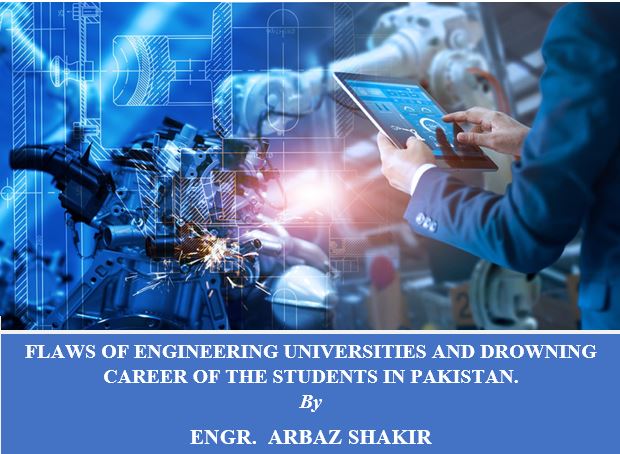Have you ever wondered why one-third of engineering graduates are unemployed in Pakistan?
Yes, according to the Pakistan engineering council report published in 2021, more than 100000 engineers are jobless in Pakistan. A growing number of engineers need help finding jobs in Pakistan. Did you ever notice why? After 4 years of professional studies and having a highly sought-after degree, despite having qualifications and enthusiasm still, there is no job for engineers in Pakistan. Even in this era when technology has its impacts in every field of life, its major profession is the highest unemployed in Pakistan.
Who is responsible for the whole situation? What happened to the country when it produced more engineers than it could employ? What struggles and obstacles are faced by engineering graduates in Pakistan after having a degree in their hands?
Several factors are involved in dropping the employment rate of the engineering sector.
The two major professions, engineering and medical, are highly competitive in Pakistan, and competent students all over Pakistan choose between them as a career choice. But public engineering universities are only one in all provinces of Pakistan. Due to high demand, many private universities are opened to facilitate the willing students to pursue engineering as their career choice, leading to the degradation of the engineering profession, a high unemployment rate, and lowering its standard in Pakistan.
The scenario of engineering education as a profession is so that after passing an intermediate exam, an intelligent student with a keen desire to pursue an engineering degree for their future goal goes through competitive tests like ECAT and ETEA to get admission in public sector universities and then secure a seat for them. On the other hand, the students with low academic scores and disappointing performance did not take any tests or examinations and enrolled in any private university. Thus the two come in the same position with many different capabilities and qualities.
When these two graduates come into the market, a vast crowd will be generated, which causes never-ending unemployment in the engineering sector. Another cause is engineering academic failure; the universities are responsible for producing engineers with skills, knowledge, and having problems solving abilities. Engineers are the next generation innovators and challenge acceptors. They should know the techniques, skills, and procedures for tackling society’s problems. But engineering universities in Pakistan need to meet their objectives. The engineers produced by these universities need to be proficient, and the reason behind the academic failure is only and only faculty their policies and way of teaching because there is a lecture system in these universities. Faculty members are permanent employees there, so they once make the ppt slides for the complete course and teach these to every future batch of the successive session. The process is even continued for the whole tenure of a teacher in the university or as long as he is concerned with that subject.
That does not end here now. The students’ exams are past papers because the professors and lecturers need more time to prepare a new document after every two months in the semester system. The students are fully aware of this policy and thus collect past papers from their seniors or the university’s administration and go through these particular questions for their exam preparation and, therefore, with their exam with good scores.
Another factor is lack of skills because universities and engineering colleges do not pay any attention to the skills-producing activities in the students; thus, the most common and prerequisite skills which are for all engineering fields without any exception like problem-solving, communication, teamwork, time management, creativity and even the most important one is continuous learning habit did not find in engineering graduates in Pakistan.
One more factor is the lake of practical work experience. Almost all universities in Pakistan have fully equipped labs of a very high standard, but these labs only fulfill the paper requirements and are not utilized for specific purposes. The students go there with the teacher, who explains an experiment verbally and then asks them to do it individually. Even the teachers were not trained for the lab work and needed practical experience with that technology. Now, what can we expect from these types of graduates who are paralyzed in their profession? When employers interview these engineers, they still need to satisfy them.
Last but not most minor, the cause is that universities need to provide internship opportunities for students. They have to search for an internship on their own which is much more difficult for them because they are part of such a system in which they learn nearly nothing to such extent as to be expected but only some theoretical knowledge.
Only some of Pakistan’s engineering graduates are the same as in the above scenario. Still, competent, hardworking, and struggling students do all their academic work independently and make themselves exceptional. Still, these are only five to six percent of the total production.
The Pakistan Engineering Council (PEC) also has a key role in pushing the engineers into that dilemma because there are no rules and standards for the universities which are playing with the student’s future and issuing degrees with the approval of the PEC.
Also, PEC did not set any measures to employ engineering graduates or consider them for internships. In the firms, non-engineering individuals are posted against engineering positions, violating rules and discriminating against engineering degree holders. Another concept about getting employment is that every firm and consultant prefers and hires individuals with experience. Now the question is where the fresh graduates go and who will hire them? New engineers in Pakistan need jobs for experience and experience for getting the job.
As a result of such a high unemployment rate in the last few years, the student’s interest in pursuing engineering degrees in Pakistan.

